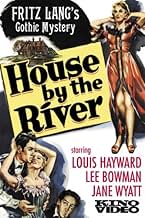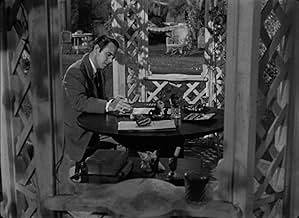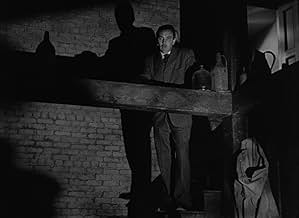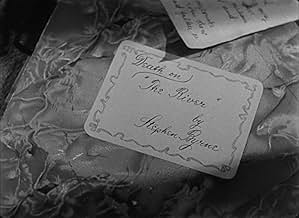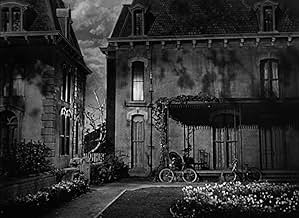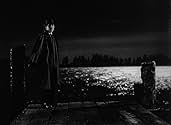NOTE IMDb
7,0/10
4,6 k
MA NOTE
Un écrivain fou assassine une femme de ménage après qu'elle ait résisté à ses avances. Il fait appel à son frère pour cacher le corps, puis observe la scène alors que son frère devient le su... Tout lireUn écrivain fou assassine une femme de ménage après qu'elle ait résisté à ses avances. Il fait appel à son frère pour cacher le corps, puis observe la scène alors que son frère devient le suspect principal du meurtre.Un écrivain fou assassine une femme de ménage après qu'elle ait résisté à ses avances. Il fait appel à son frère pour cacher le corps, puis observe la scène alors que son frère devient le suspect principal du meurtre.
- Réalisation
- Scénario
- Casting principal
Bob Burns
- Courtroom Spectator
- (non crédité)
Edgar Caldwell
- Square Dancer
- (non crédité)
Edward Clark
- Minor Role
- (non crédité)
Frank Dae
- Col. Davis
- (non crédité)
Avis à la une
The most interesting aspect of House By The River is the fact that it was produced at Republic Pictures, the home of Roy Rogers and several other B movie cowboys and the values those pictures put forth. Hardly the place for a moody and atmospheric thriller that examines a man's moral degeneracy directed by Fritz Lang who always likes to explore the dark. One thing that does mark this as a Republic film is the usual Herbert J. Yates economy.
But for a director like Lang who was used to exploring shadowy worlds, economy on the set isn't a hindrance, though back in Germany this man directed the opulent Metropolis. House By The River delivers the most for its meager budget.
Louis Hayward who was a poor man's Tyrone Power and like Power could play straight heroes and hero/heels gets his Nightmare Alley type role as the rich and idle writer who just can't move the writer's block. He takes a real fancy to maid Dorothy Patrick and when she repulses his advances, Hayward kills her. He gets older and club footed brother Lee Bowman to dump the body in the river. But as dead bodies will do, they bloat and have a nasty habit of floating to the top.
Lang and Hayward create a really frightening picture of moral degeneracy that would have resonated well with post World War II audiences who had just defeated a nation gripped in the philosophy that it was a race of super people. Jane Wyatt gets her innings in playing Hayward's wife who Bowman also loved and who starts thinking that maybe she married the wrong brother.
I have to single out Jody Gilbert from the cast who plays Bowman's housekeeper and who Bowman takes his frustrations out on after he's helped Hayward. She's not the sharpest knife in the drawer and misreads all of Bowman's signals and later does him damage at a coroner's inquest.
I'm not sure how much money House By The River brought in to Republic Pictures, but it is a minor masterpiece for this studio.
But for a director like Lang who was used to exploring shadowy worlds, economy on the set isn't a hindrance, though back in Germany this man directed the opulent Metropolis. House By The River delivers the most for its meager budget.
Louis Hayward who was a poor man's Tyrone Power and like Power could play straight heroes and hero/heels gets his Nightmare Alley type role as the rich and idle writer who just can't move the writer's block. He takes a real fancy to maid Dorothy Patrick and when she repulses his advances, Hayward kills her. He gets older and club footed brother Lee Bowman to dump the body in the river. But as dead bodies will do, they bloat and have a nasty habit of floating to the top.
Lang and Hayward create a really frightening picture of moral degeneracy that would have resonated well with post World War II audiences who had just defeated a nation gripped in the philosophy that it was a race of super people. Jane Wyatt gets her innings in playing Hayward's wife who Bowman also loved and who starts thinking that maybe she married the wrong brother.
I have to single out Jody Gilbert from the cast who plays Bowman's housekeeper and who Bowman takes his frustrations out on after he's helped Hayward. She's not the sharpest knife in the drawer and misreads all of Bowman's signals and later does him damage at a coroner's inquest.
I'm not sure how much money House By The River brought in to Republic Pictures, but it is a minor masterpiece for this studio.
House by the River is something of an anomaly; it's more of an old-dark-house Gothic than the grittier dramas, from Fury to Beyond A Reasonable Doubt, which Fritz Lang made in his American period. (The location of this house is a worrisome and amateurism anomaly, too; the conventions, milieu and some of the accents suggests that it's an English country estate, but much else argues that the film takes place in the U.S.) Would-be writer Louis Hayward, getting flirtatious with the maid in the absence of his wife (Jane Wyatt), accidently strangles her when she resists his advances. His brother (Lee Bowman) reluctantly agrees to cover up for him and help sink the body in the sinister, ever-present river that runs by the edge of the property; the resulting scandal of the disappeared servant bolsters the writer's flagging career. When suspicion begans to gather around his innocent brother, Hayward, by now seriously demented, couldn't be more pleased. But then Wyatt comes across a hidden manuscript; Hayward (you see), flushed by his phoney success, resolves to write "what he knows...."
Edward Cronjager's heavily shaded cinematography and Georges Anthiel's brooding score help fill out Lang's dark, clammy vision, making the river -- forever disgorging its flotsam and jetsam -- a principal character in the action. House by the River is a good old-fashioned thriller, particularly in its Gothic closing scenes, but it's not in a class with Lang's films at the top of his American form, like Scarlet Street, The Big Heat or Human Desire.
Edward Cronjager's heavily shaded cinematography and Georges Anthiel's brooding score help fill out Lang's dark, clammy vision, making the river -- forever disgorging its flotsam and jetsam -- a principal character in the action. House by the River is a good old-fashioned thriller, particularly in its Gothic closing scenes, but it's not in a class with Lang's films at the top of his American form, like Scarlet Street, The Big Heat or Human Desire.
The unsuccessful writer Stephen Byrne (Louis Hayward) tries to force his servant Emily Gaunt (Dorothy Patrick) sexually while his wife Marjorie Byrne (Jane Wyatt) is visiting a friend and accidentally strangles her. His crippled brother John Byrne (Lee Bowman) coincidently comes to his house in that moment, and Stephen asks him to help to get rid of the corpse and avoid an scandal, since his wife would be pregnant. The naive and good John helps his brother to dump the body in the river nearby his house. Stephen uses the disappearance of Emily to blame her and promote his book. When the body is found by the police, all the evidences points to John, and he becomes the prime suspect of the murder.
"House by the River" is a dark and tense movie with one of the most despicable characters I have ever seen. Louis Hayward is perfect in the role of a scum, capable of killing, defaming, lying, falsely accusing, and maintaining cold blood. Jane Wyatt and Lee Bowman complete the efficient trio of lead cast. Fritz Lang uses with mastery the shadows and lights in the black and white cinematography as usual. The story is very tense, but the conclusion is very abrupt and quite conventional, moralist and commercial. In my opinion, this excellent film deserved a darker and amoral ending to become another masterpiece of this outstanding director. My vote is nine.
Title (Brazil): "Maldição" ("Curse")
"House by the River" is a dark and tense movie with one of the most despicable characters I have ever seen. Louis Hayward is perfect in the role of a scum, capable of killing, defaming, lying, falsely accusing, and maintaining cold blood. Jane Wyatt and Lee Bowman complete the efficient trio of lead cast. Fritz Lang uses with mastery the shadows and lights in the black and white cinematography as usual. The story is very tense, but the conclusion is very abrupt and quite conventional, moralist and commercial. In my opinion, this excellent film deserved a darker and amoral ending to become another masterpiece of this outstanding director. My vote is nine.
Title (Brazil): "Maldição" ("Curse")
House by the River (1950)
A straight up Gothic murder scenario with echoes of the 1945 "Spiral Staircase." A family with two brothers at odds with each other is living in a house and one of them is a murderer. And at first only the audience knows who. Their relative isolation on the banks of a wide river means only that they will have little help when danger occurs. The neighbors and police and few and far.
Louis Hayward plays the main character, Stephen Byrne, a writer and a bit of a self-important cad. Hayward has an odd style on film during this era, attractive and likable at first, but with an acerbic humor and some kind of unworkable stiffness, as if you know he's always performing. But he's clever about it, and when you realize he isn't meant to be exactly lovable, he's pretty well cast. Byrne's brother, wife, and maid all come through with solid if uninspired performances, and you wonder exactly what held everyone back. Fritz Lang has many more successful melodramas than this one.
I think the weakness is largely the raw material, the story itself, which is a bit straight forward. One brother commits a murder, the other is drawn into helping cover it up, and then the tensions build between them as an inquest raises questions. It has moments, but there are no further twists that work. The ending is out of character, almost comical in its false (and unlikely) horror.
Along the way, though, are a series of nice scenes, inside the house at night, along the river at night, at a party meant to hide the killer's guilt, and so on. The music is especially helpful in jabbing the audience at key moments. American Georges Antheil was a composer famous for his avant-garde pieces in the 1920s in Europe before settling into a Hollywood routine. You can detect, and appreciate, the edge he brings to the score. The photography by contrast is good without rising up to the possibilities of these kinds of settings--the house, the river, the dock, all have more dramatic potential that we just don't see.
A straight up Gothic murder scenario with echoes of the 1945 "Spiral Staircase." A family with two brothers at odds with each other is living in a house and one of them is a murderer. And at first only the audience knows who. Their relative isolation on the banks of a wide river means only that they will have little help when danger occurs. The neighbors and police and few and far.
Louis Hayward plays the main character, Stephen Byrne, a writer and a bit of a self-important cad. Hayward has an odd style on film during this era, attractive and likable at first, but with an acerbic humor and some kind of unworkable stiffness, as if you know he's always performing. But he's clever about it, and when you realize he isn't meant to be exactly lovable, he's pretty well cast. Byrne's brother, wife, and maid all come through with solid if uninspired performances, and you wonder exactly what held everyone back. Fritz Lang has many more successful melodramas than this one.
I think the weakness is largely the raw material, the story itself, which is a bit straight forward. One brother commits a murder, the other is drawn into helping cover it up, and then the tensions build between them as an inquest raises questions. It has moments, but there are no further twists that work. The ending is out of character, almost comical in its false (and unlikely) horror.
Along the way, though, are a series of nice scenes, inside the house at night, along the river at night, at a party meant to hide the killer's guilt, and so on. The music is especially helpful in jabbing the audience at key moments. American Georges Antheil was a composer famous for his avant-garde pieces in the 1920s in Europe before settling into a Hollywood routine. You can detect, and appreciate, the edge he brings to the score. The photography by contrast is good without rising up to the possibilities of these kinds of settings--the house, the river, the dock, all have more dramatic potential that we just don't see.
House by the River is directed by Fritz Lang and adapted by Mel Dinelli from A.P. Herbert's novel The House on the River. It stars Louis Hayward, Jane Wyatt, Lee Bowman & Dorothy Patrick. Music is by George Antheil and photography by Edward J. Cronjager.
Novelist Stephen Byrne (Hayward) makes a play for the house maid and unwittingly kills her when she repels his advances. Enlisting the help of his disabled brother, John (Bowman), to dispose of the body in the river, Stephen suddenly finds that the publicity surrounding the maid's disappearance has put him in vogue again. In fact he finds his muse sufficiently stoked enough to craft another novel. But as easy as Stephen finds it easy to have no conscience, the opposite is the case with John, and with the river refusing to hold its secrets, something is going to give.
Working out of Republic pictures, Lang refused to let the low budget production hamper his vision of a bleak Cain & Abel like Gothic-noir-melodrama. He did, however, meet some resistance when requesting that the maid be played by a black woman, which was quickly shot down by nervous executives at the famed "B" movie studio. House by the River is far from being among the best of Lang's work, but the final product is still a triumph considering it's basically a three character piece set virtually in just two locations. It scores high on eerie atmosphere and finds Lang dealing in moral bankruptcy/responsibility and the eye for an eye mentality. Ushered into the narrative, too, is a Lang fave of people irked by loving someone they can't have. These themes allow the director to gloss over the simple script and dally in some truly arresting visuals.
Aided considerably by Cronjager's (Desert Fury/CanyonPassage) chiaroscuro photography, Lang's film is a lesson in how to maximise effect from limited sets. The actual house on the river, and that of the neighbour (resplendent with creepy scarecrow in garden), has a very disquiet feel to it, fronted by shimmering water that carries the dead carcass' of animals, it's a most haunting setting. And the eerie atmosphere continues inside the house, where shadows work their wonders and Antheil's music sticks rigidly (and rightly) to the creaky house formula. The cast don't pull up any trees, but they don't need to. Hayward is perhaps too animated for a study in snide villainy, but it works and he has a nice line in visual mocking. The rest fall in line for what is required, with the best of the bunch being Ann Shoemaker as nosey neighbour Mrs. Ambrose.
Once a hard to find film, House by the River is now easily accessible after gaining a DVD release (the print is fine, some age spotting and crackles, but completely watchable). It's a film that is easily recommended to Lang and Gothic house based movie purists. Driven by a despicable protagonist and cloaked in a creepy noirish vibe, it deserves to now gain a better and more appreciative audience. 7.5/10
Novelist Stephen Byrne (Hayward) makes a play for the house maid and unwittingly kills her when she repels his advances. Enlisting the help of his disabled brother, John (Bowman), to dispose of the body in the river, Stephen suddenly finds that the publicity surrounding the maid's disappearance has put him in vogue again. In fact he finds his muse sufficiently stoked enough to craft another novel. But as easy as Stephen finds it easy to have no conscience, the opposite is the case with John, and with the river refusing to hold its secrets, something is going to give.
Working out of Republic pictures, Lang refused to let the low budget production hamper his vision of a bleak Cain & Abel like Gothic-noir-melodrama. He did, however, meet some resistance when requesting that the maid be played by a black woman, which was quickly shot down by nervous executives at the famed "B" movie studio. House by the River is far from being among the best of Lang's work, but the final product is still a triumph considering it's basically a three character piece set virtually in just two locations. It scores high on eerie atmosphere and finds Lang dealing in moral bankruptcy/responsibility and the eye for an eye mentality. Ushered into the narrative, too, is a Lang fave of people irked by loving someone they can't have. These themes allow the director to gloss over the simple script and dally in some truly arresting visuals.
Aided considerably by Cronjager's (Desert Fury/CanyonPassage) chiaroscuro photography, Lang's film is a lesson in how to maximise effect from limited sets. The actual house on the river, and that of the neighbour (resplendent with creepy scarecrow in garden), has a very disquiet feel to it, fronted by shimmering water that carries the dead carcass' of animals, it's a most haunting setting. And the eerie atmosphere continues inside the house, where shadows work their wonders and Antheil's music sticks rigidly (and rightly) to the creaky house formula. The cast don't pull up any trees, but they don't need to. Hayward is perhaps too animated for a study in snide villainy, but it works and he has a nice line in visual mocking. The rest fall in line for what is required, with the best of the bunch being Ann Shoemaker as nosey neighbour Mrs. Ambrose.
Once a hard to find film, House by the River is now easily accessible after gaining a DVD release (the print is fine, some age spotting and crackles, but completely watchable). It's a film that is easily recommended to Lang and Gothic house based movie purists. Driven by a despicable protagonist and cloaked in a creepy noirish vibe, it deserves to now gain a better and more appreciative audience. 7.5/10
Le saviez-vous
- AnecdotesFritz Lang originally wanted a black woman to play the role of Emily Gaunt, but the producers refused.
- GaffesThe women are dressed in turn of the century type clothing but the men are wearing modern hats and suits.
- Citations
John Byrne: You must be very, very ill Stephen...
Stephen Byrne: Ill?
- Bandes originalesTurkey in the Straw
(uncredited)
American folk song
Author unknown
Meilleurs choix
Connectez-vous pour évaluer et suivre la liste de favoris afin de recevoir des recommandations personnalisées
- How long is House by the River?Alimenté par Alexa
Détails
- Date de sortie
- Pays d’origine
- Langue
- Aussi connu sous le nom de
- House by the River
- Lieux de tournage
- Société de production
- Voir plus de crédits d'entreprise sur IMDbPro
- Durée
- 1h 23min(83 min)
- Couleur
- Rapport de forme
- 1.33 : 1
Contribuer à cette page
Suggérer une modification ou ajouter du contenu manquant


